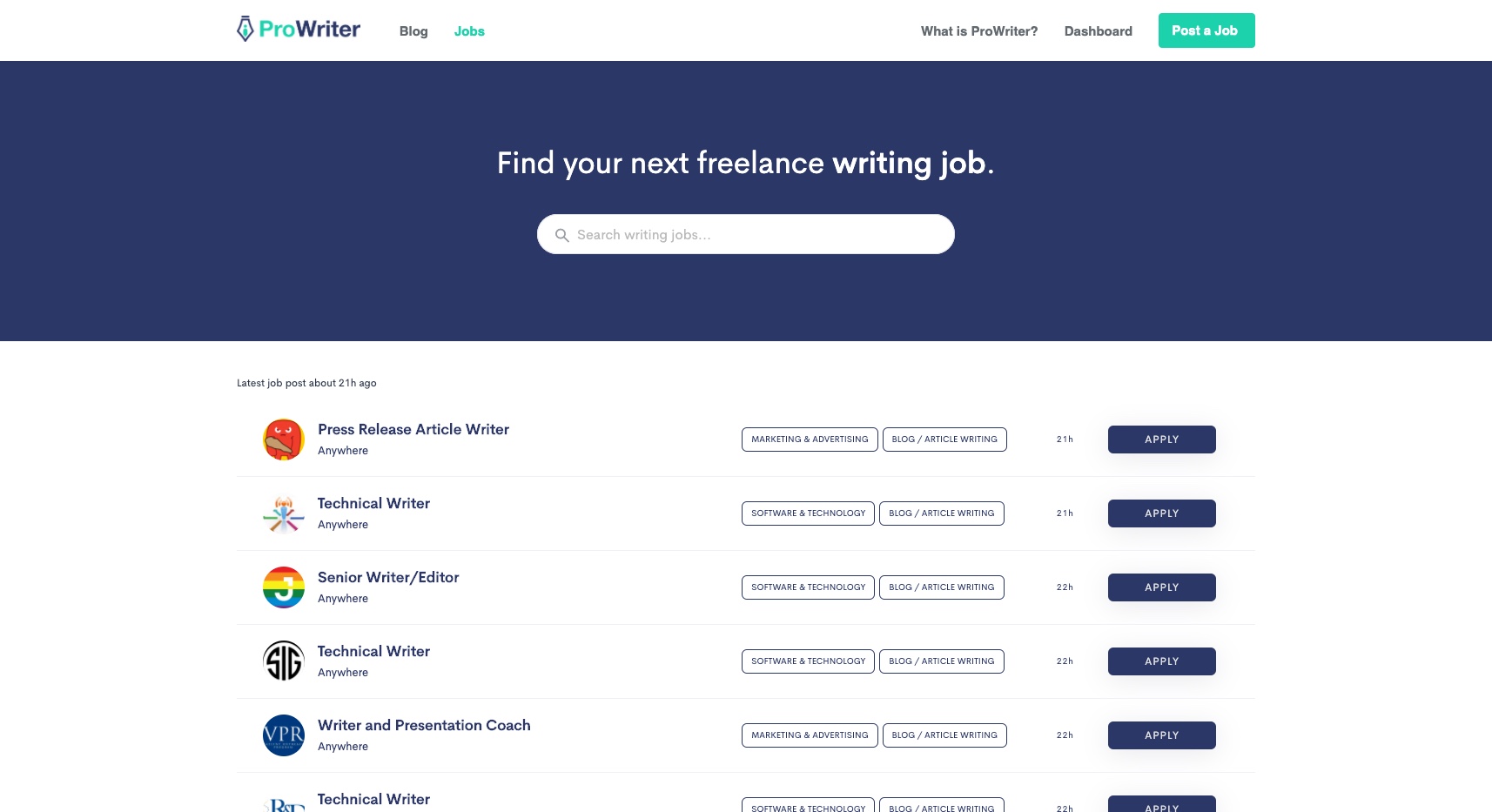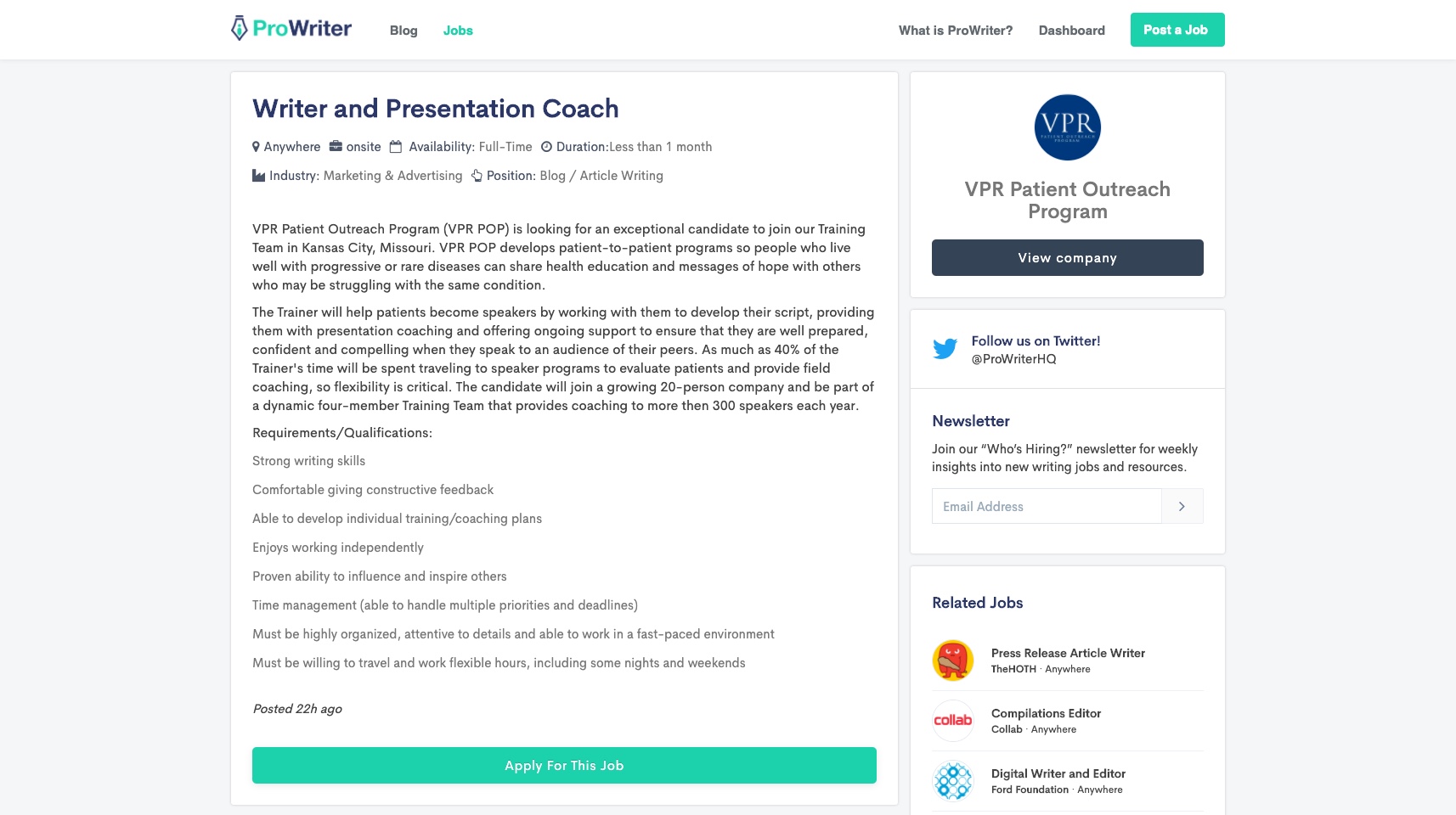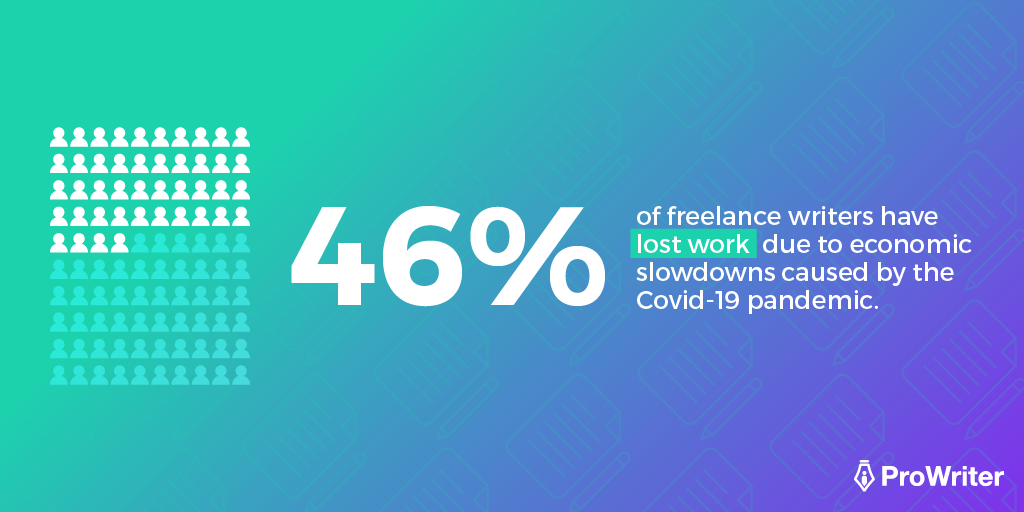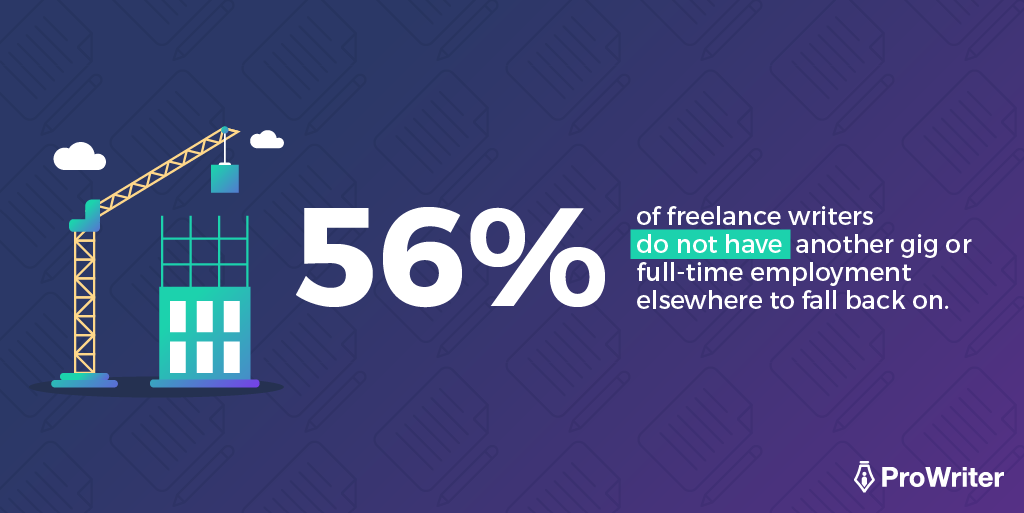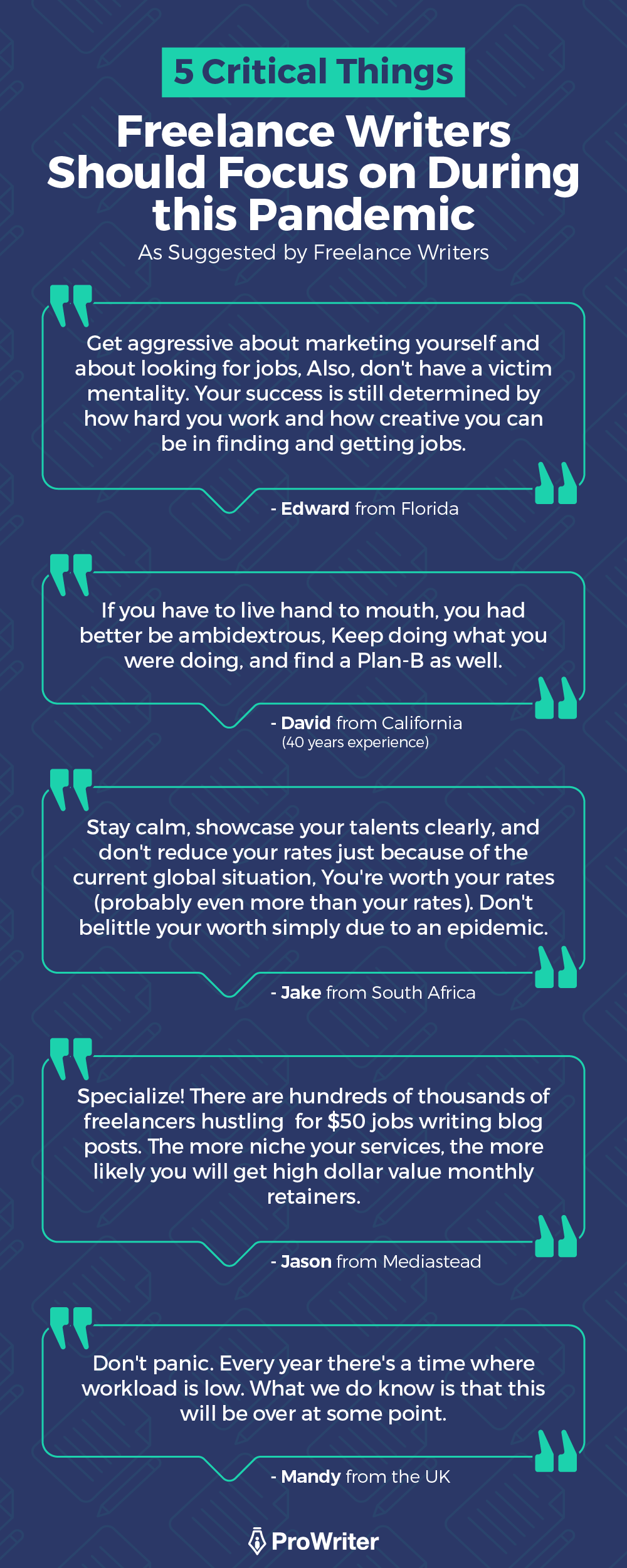If you’re a freelance writer working on building your portfolio, guest blogging is a smart way to go. But how do you find potential clients, and more importantly, how do you get the job? That, my friend, all comes down to the art of the pitch.
How to pitch a guest post:
There’s no formula for a perfect pitch that lands you a guest post gig every time. Even if there were, the site’s owner has a schedule too, and may never see your email. But there are some things you can do to better your chances, and some definite no-nos to avoid.
First thing’s first — you’re not alone. Crafting a job-winning pitch is something every writer struggles with.
Until you get to a point where you can sell your services on networking or name recognition alone, it’s a slog. So where can you turn for help?
Well, it depends on what you’re trying to accomplish. Do you want to become a columnist at the New York Times? Do you want to craft SEO content that helps small businesses stand out in search? Do you just want to write a fun listicle at Buzzfeed?
Where you’re at in your career, what your ultimate goals are, and who you’re looking to pitch all change the calculus of how to pitch.
There are dozens of articles on this topic all over the web, some better than others. For the purposes of this post, we’re going to focus on the general best practices that should help you no matter what you’re pitching.
To help you get there, we’ll give you 6 questions you should ask yourself before you click “send” on that pitch.
We’ll also cover some red flags that immediately disqualify you no matter who you’re pitching, including the downside to using pitch templates.
Pencils up!

Question #1: Who are you pitching?
We know how it goes. You sit down, you pick 20-30 good targets for a pitch, you find their contact email, you send them a note.
But you have to do a little more than that next time.
Remember that ultimately you’re pitching a person. A human being is going to read your pitch and make a decision about whether or not to hire you. Whatever you can do to make a human connection in that first sentence, you should do.
Try to find the site’s owner, manager, or editor on LinkedIn. At least look at the About page and see if you can glean details you can use when you introduce yourself. Learn about them and use what you learn to make a connection.
I see right through this tactic when I read a pitch that starts on a more personal note. And still, I fall for it every time.

Applicants who have done some looking into me and the company seem like they’re more serious, and I’ll at least check out what they have to say.
It might feel a little creepy. But opening with something like “Hello from a fellow racquetball player!” is not the same as “you have cute kids!” or “your house looks just like mine!” which, yes, would be extremely off-putting. Trying to establish a connection on a shared hobby is perfectly harmless.
This isn’t always easy to do, of course. Some email addresses you’ll find are just “contact@” addresses.
But a person who represents a brand is still reading the applications.
If you can’t figure out who you’re pitching, try to glean something about the values of the company or the owner of the company you’re pitching and talk about how it resonates with you.
Be resourceful. Be genuine. Sending a generic email to every email address you can find only shows that you’re hoping for any job. This approach shows that you actually want this job.
Question #2: What do they publish?
Anyone you’re going to pitch has put out content before.
So what’s it like?
How much of it have you read?
What topics have they already covered?
Make sure you read up on the potential clients you’re pitching as much as possible. Not only do you want to make sure you don’t pitch them something they’ve already covered, getting familiar with what they’ve been putting out so far will give you ideas on how to sell yourself.
What I mean is that if you have a certain background or skillset that isn’t showing up in what they’ve published so far, the pitch would be a good place to talk about it.
There are good ways and bad ways to do this, of course. I wouldn’t advise saying something like:
“I noticed you don’t use keywords. You’re missing out on a lot of business! I’m an SEO writer, hire me and I’ll write good keyword content!”
Be a little savvier; humble-brag about your skills, but let them connect the dots.
For example, take a look at their previous coverage. It might give you an idea for a pitch, as well as an excuse to talk about your competencies.
Instead, your email should sound something like this:
“I’ve noticed you’ve covered this topic back in 2018, but a lot has changed since then. For instance, [points A, B, and C]. I think your readers would benefit from another take on this topic, and I’ve not only written on this topic before, but I use more recent SEO best practices that have helped previous clients climb in the rankings.”
Getting a sense of their brand voice will also help you (if you get the job) to write better content they’ll be happy to publish.
Also, you might want to check out their social media profiles. See how they interact with their audience, or make announcements. If they post memes, that would suggest they’re comfortable with a more casual, humorous approach from time to time.
The point is, there’s a lot you can learn from the content they’ve already put out there, both in terms of what they like and how you can help them improve.
Last tip: Whoever you’re pitching may also have submission guidelines already. Try to find them. (Pro tip: a lot of more popular publications and blogs make these guidelines kind of hard to find to discourage casual pitches, so it may take some digging).
Question #3: Ask yourself, ‘how can I add value?’
There’s only one thing an employer is thinking when they read a pitch:
“How will this add value to my audience?”
Sure, maybe they ask it like “how will this help me drive sales” or “how will this help me go viral” but the core of what they’re asking is all about how a potential reader will benefit.
Because if the reader benefits, this is how your client will feel:

After doing your research on who you’re pitching and what they like to write about, you should have something pretty specific and insightful to open your email with.
But that just gets you a seat at the table.
To close the deal, you need to demonstrate how you can add value.
You don’t need to try and skate around the fact that you want this employer to do something for you. You want their money, or exposure, or both. They know this already. What you have to do is justify why they should give it to you and not everyone else who has sent them a pitch.
Maybe the value you bring is a fresh angle on a topic they’ve covered, or something relevant to their audience that no one else is talking about yet. Maybe you bring a special insight to the topic that will make their content more unique.
The point is, focus on what their readers will find value in, and how you can provide it. An employer is not going to help you if you can’t explain how you can help them.
Question #4: What will make them ‘bite’?
I’m sure this will be a controversial point, but go with me on it for a moment: Whoever you’re pitching, pitch your best idea right away.
I hear the critics already. Some writers might be afraid to share their “best idea” with a potential employer because that employer could always just take the idea and run with it themselves.
Well, here’s the truth about that…

… Yes, that could totally happen.

I know.
BUT. If you’ve worked through questions 1-3 by this point, you should have a pretty bespoke idea for each pitch, right?
If a pitch is so generic that you can send it to 100 different outlets, then it’s probably not exciting enough to appeal to even one of them.
The point is this: Pitch ideas are cheap. Execution is everything.
Pitching a compelling topic is your chance to show off. It’s an audition. You need to give an employer something to picture. Something that they’re excited to share with their audience.
If they like the idea enough, they’ll hire you to write it.
The worst-case scenario is not that they “steal” your idea and assign it to someone else.
The worst-case scenario is that you pitch vague, generic concepts, or promise great ideas for content after they hire you, and they delete your email.
Question #5: Can I deliver flawless copy?
We’ve made this point in other posts, but it bears repeating often: Your client is not your editor.
You are a writer. The reason freelance writing is a career at all is that writers have a skillset their employers don’t have: the ability to write well.
So, it should follow that you actually bring the skillset that you were hired for to the table.
Freelance writing can be difficult. When you’re starting out, you likely take lower-pay jobs, and you need to work as quickly and efficiently as possible. You don’t always have time to give each piece of copy the once-or-twice-over it deserves.
Not only that, some writers rush in with a half-formed idea and write without any sort of outline, hoping they figure it out as they go.
Sometimes that works well enough and saves you time. But more often than not, it results in a choppy piece of content your employer has to fix.
If you turn in copy that your employer has to fix, it almost guarantees you will never work for them again.
What do you think takes up more time? Crawling the web, “cold calling” for opportunities? Or taking the time to knock each piece of content you write completely out of the park?
Pitch the clients you actually want to work for. Then, deliver them flawless content they’d be crazy not to publish. Invest in recurring opportunities with those clients, not the “cold calling” approach.
Question #6: Am I easy to vet?
So, to recap:
- You’ve made a connection
- You’ve studied their content
- You’ve shown how you can add value
- You pitched a great idea
- You can turn in flawless copy
If I’m reading this pitch, I’m feeling pretty good about who you are and your ability to create great content. There’s just one nagging thought left in my head.
“How do I know I’m not going to be catfished again?”

I’m going to let you in on a little secret.
This happens a lot.
A lot.
Everyone who has ever hired a writer has a horror story (or 12) about a well-written pitch, good writing samples, and customer reviews that sound great, only to hire the writer and receive a first draft of copy that looks like the result of a keyboard being thrown down a flight of stairs.
I have to be honest and say I don’t know what accounts for this. Some of it might be the grind on freelance writers earlier in their careers. They feel pressured to turn in copy quickly, collect their check, and move on to the next opportunity.
Maybe there are well-written pitch templates that they just drop a potential title into and that’s enough to convince some employers to hire them.
I have also encountered writers who run their own mini-agencies, paying less-experienced writers 1 cent per word or less to do most of the heavy lifting. That writer then punches it up a little and puts their name on it.
The freelance/employer dynamic is a little broken. There are plenty of employers who can’t explain what they want, skip on pay, and berate and abuse writers. But keep in mind that there are good employers who also get burned in this dynamic.
The solution? Make it easy for an employer to verify that you are who you say you are.
It’s something we’ve written about before, and indeed, it’s a grounding assumption of ProWriter’s own business model:
Employers need the confidence that you are who you say you are and can do what you say you can do.
One thing that those potential catfish applicants have in common is that for all intents and purposes, they don’t exist online. No social profiles, no website, nothing.
An active digital footprint is an asset, and that trend is only going to increase in the coming years.
My advice? Put a picture, your name, your website, and your social channels in the signature of your email pitch. Be easy to find and verify.
You don’t need every profile on the planet, just a couple. Or, you can just use a ProWriter profile, which pulls together all of your links and includes third-party identity verification.
TL;DR: Be a real human!
Pitch templates: a HUGE red flag for me
At this point, you might be thinking something like “okay, this advice makes sense, but you’re asking for a huge time commitment boost to my pitching game and that’s just not realistic.”
I get it. Like I said above, I understand the grind of the freelance writer’s first couple of years.
But let me tell you something about the competition, i.e., the people you’re competing with for the jobs you want so badly.
They’re not really a threat.
As a former editor, it wasn’t uncommon for me to receive 500 or more pitches when I posted an ad on Upwork, Problogger, or other boards.
Even if I wasn’t actively looking, it wasn’t uncommon to receive 15-20 a day.
Almost all of them wound up in the trash.
Why?
Because most of them look like this:
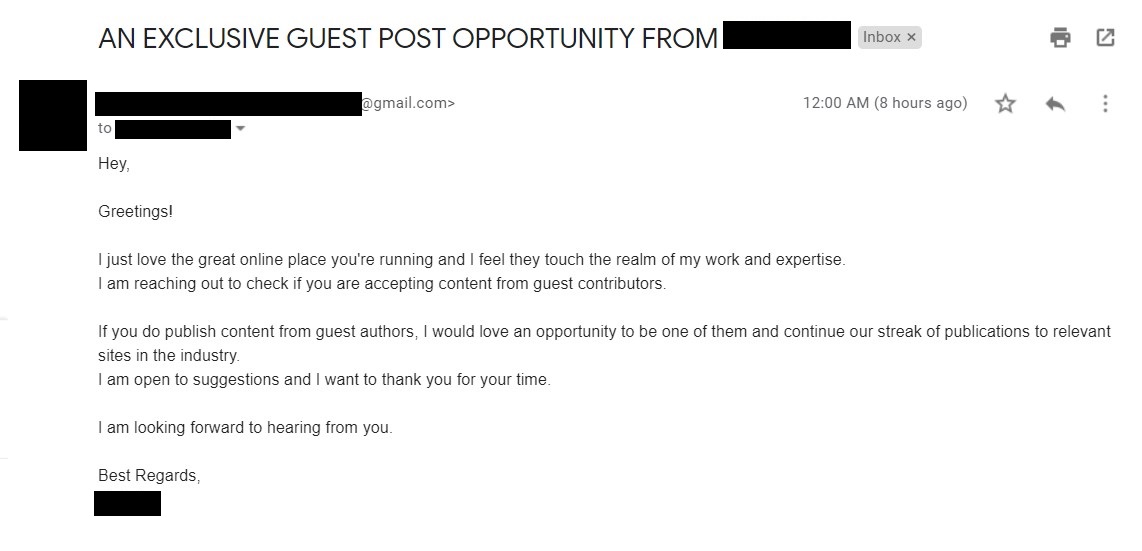
Where to even begin with how wrong this is?
- It makes a generic attempt at connection, but doesn’t even name our business
- It promises “exclusive” value, but doesn’t explain what that value is
- It’s a “cold call,” skipping any interest in who we are and just asking us if we’re hiring
- It gives me the homework of coming up with angles they can write for me
- It’s not well-written
- I have no idea who wrote it and no way to vet them.
This is obviously just a copy/pasted template blasted to everyone on an email list in a desperate attempt to get a gig.
If anyone who saw this pitch hired this writer, I will buy them a steak dinner and get their story.
My guess is the same as yours: that no one bothered, and I will eat alone.
Here’s the point
If you feel like this post is asking you to put too much into your pitches — that you don’t have time, and that this is too much effort for anything other than a sure hire — know this.
Yes, pitching is a slog.
Most pitches go unanswered, or get a “no.”
But you would be stunned how low quality most pitches are.
A Point Visible survey found that a lot of pitches editors get are so bad, they don’t even bother to read them, and that nearly half of submitted content is terrible quality.
If you take nothing else away from this article, chew on this:
Whenever the competition is this bad, it means there’s an opportunity for good writers like you.
More resources for writers
If you want some more technical advice on this topic, especially with regard to finding opportunities using search, this post from Neil Patel ain’t bad.
If it’s not obvious by now, I would advise skepticism toward blog posts offering “pitch templates” for the reasons outlined above. Using a template you found online is like using another writer’s toothbrush.
It just isn’t right.
You can use a pitch template to get an idea of how to pitch, but ultimately, you need to figure out what works for you and custom-pitch each outlet.
If you want to learn some SEO skills to humble-brag about in your pitches, you can check out this free guide ProWriter put together specifically for writers. “SEO” can come off as kind of a buzzword when you talk to clients, so don’t oversell it.
The smart position is to look like you know enough about it to be a good writer for digital. Don’t try to push yourself as some kind of guru. There are a lot of people that do, and it usually engenders suspicion, not confidence, in employers.
We post bonus SEO tips on our social channels, so find and follow us @prowriterhq.
If you’re new to writing and/or need a professional online writing portfolio, ProWriter has a free one you can create here.
Lastly, we have a newsletter that aggregates job posts from all over the web every Monday. We also offer other free resources for writers in each issue. You can sign up here.



















